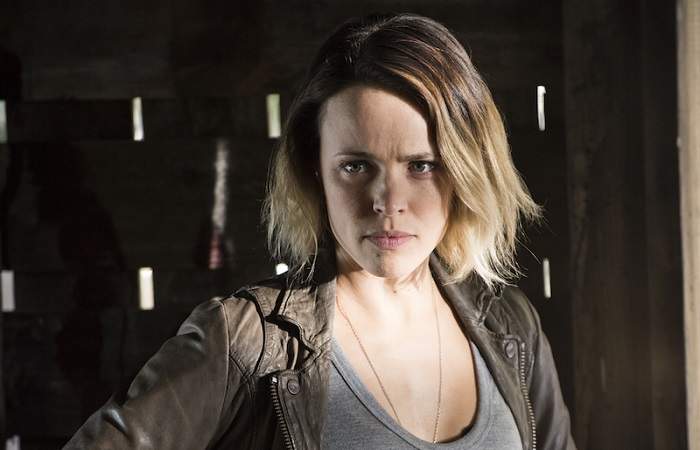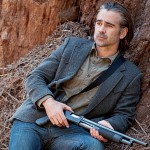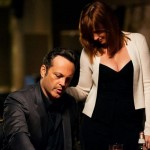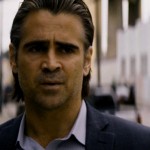
A lot has been said about the overabundance of plot lines that the second season of True Detective is currently tying together, which I think can summed up with one question.
Who the fuck is Stan?
He has a wife and kids. Frank is clearly upset about his erstwhile henchman's passing enough that he visits Stan's widow to compensate her for her loss, and assure his moppet son that he was, in fact, a great guy. And I feel terrible because I can't remember a single thing Stan did before he turned up dead a few episodes back. And I've seen every episode of this show at least twice. Either I'm slipping, or Stan was lost to the fifty other narrative threads going on around the sad tale of his cruelly interrupted life.
Still, "Church in Ruins," despite the unrevealed significance of Stan, is the best episode of the season. It strikes me as no coincidence that this entry, like "Down Will Come," shares a co-writing credit with Colorado-based novelist Scott Lasser. How differently would the bloat and lack of focus this year have played had Pizzolatto and Lasser co-written the whole season together? Like a new counterweight.
Regardless, we get some red meat here. And by that I mean an orgy.
Frank and Ray figure out they were both played, and Ray confronts the rapist of his ex-wife in prison. Apparently, that dude's nuts have an appointment with a cheese grater. It's a lovely scene, further punctuated by Ray cannonballing off the wagon with a bunch of evidence-room coke, when he has to confront the inevitable loss of his morose, Thurman Murman-looking, pseudo-son.
Woodrugh (I'm beginning to think that his name is an in-joke to which Taylor Kitsch is the punchline) talks to a retired, convalescent cop and discovers Caspere's blue diamonds were stolen in a deadly heist during the chaos of the '92 L.A. Riots — a nice call-back to Ray's conversation with his presumably racist dad (Fred Ward!) as he lamented the end of "real" police work.
Meanwhile, Frank is hunting down Ledo's sidekick Irnia, in the hopes of obtaining the all-important hard drive that will assure his stake in the land deal, while presumably making some shadowy power-brokers breathe easier. Frank is defiantly back in the game — though a line like "Where's them wetback hoochies holed up? Where she stay?" coming out of Vaughn's mouth (as he interrogates a Mexican gangbanger with a nail punch) is this week's winner of the Goddamn Pizzolatto, You Should Have Thought That One Through Award.
"Church in Ruins" really comes together with the raid on the Kubricakian Bacchanal going on up north. It's the defining moment of the season, so far, and serves to showcase Ani's promise that motherfuckers can bleed out in fifteen seconds. Oh, and it looks like David Morse molested her as a child. Which is about as big of a spoiler as Thurman Murman not being Ray's son.
Or maybe he is?
Director Miguel Sapochnik stands out, capturing some great moments and performances with impressive assurance — despite the sometimes overheated dialogue. And that was even before I remembered he was in the chair for the best episode of Game of Thrones this year, "Hardhome." I'm not sure how much of an effect Lasser's writing has on the narrative cohesion exhibited during "Church in Ruins," or on Pizzolatto in general, but Sapochnik's direction brings a momentum and clarity to the proceedings that has been largely absent this season. Except I still don't know why Stan matters. But that's my fault.
Basically, I can see why Pizzolatto dropped the occult elements he initially intended. They would have muddied the waters of an already overgrown pool. Sure it'd be awesome if some of these freaks worshiped owls or something (though we still have no idea who Caspere's bird-headed killer is). But making mad bank in backroom deals, while enjoying The Fuckening, it turns out, is complicated enough.
Besides, Pizzolatto is still married to men. Despite Ani, True Detective remains, at heart, a show about men working out their issues with each other, their fathers, and the awful worlds they create for themselves. ("We get the world we deserve.") This season, just like the last, is about hard-boiled cops. Ani just happens to be one of them. She's written with as much care as the others, in service of the story. That's always been the point. The story. Now the biggest complaint about the first season — the absence a female detective — is an afterthought to a more generalized disappointment.
People are hemming and hawing about this shit like Radiohead fans who argue over Pablo Honey and Kid A. Sure, I like one more than the other, too. But I'm still always interested in what the band is doing next.











